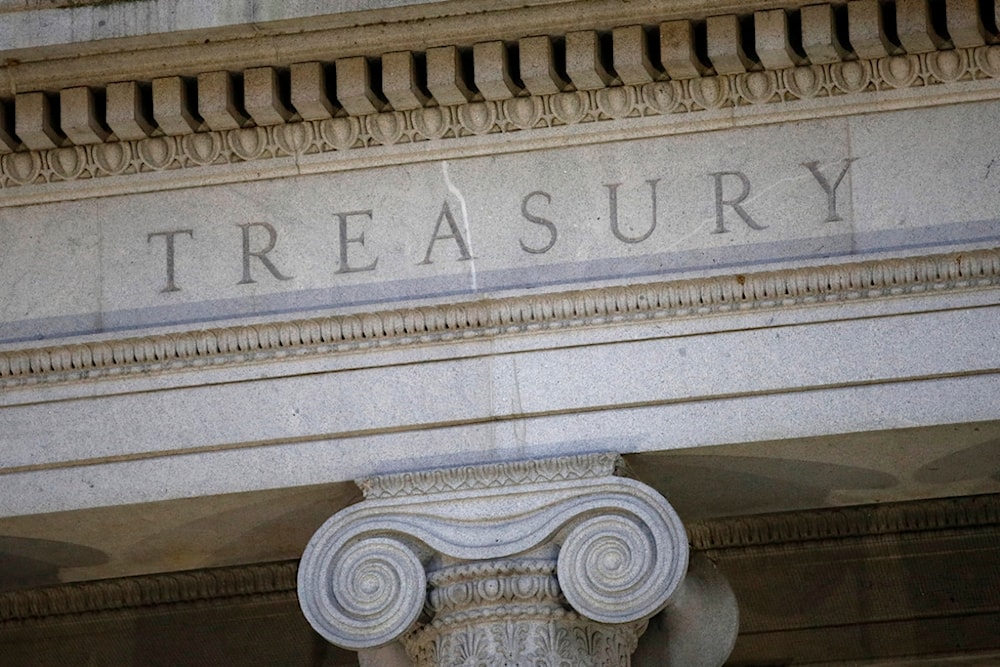US Treasuries face historic selloff amid sweeping tariffs
Long-dated bonds bore the brunt of the selloff, driven largely by hedge funds unwinding leveraged bets.
-

This June 6, 2019, file photo shows the US Treasury Department building at dusk in Washington (AP)
US Treasuries, long considered the bedrock of the global financial system, came under heavy selling pressure on Wednesday, signaling growing investor unease as turmoil caused by sweeping US tariffs sparked forced selling and a scramble for cash.
The dollar, another traditional safe haven, also weakened against major currencies, underscoring shaken confidence in the world's largest economy.
Ten-year Treasury yields have surged 44 basis points to 4.44% this week alone, on track for the biggest weekly jump since 2001.
The sharp selloff in the $29 trillion Treasury market has dragged borrowing costs higher across the globe, raising urgent concerns among central banks and policymakers already grappling with an economic slowdown triggered by the highest US tariffs in more than a century.
Japan signaled it would cooperate with the Group of Seven (G7) and the International Monetary Fund (IMF) to help stabilize markets. Yields on Japan’s 30-year government bonds jumped to 21-year highs, while Britain's 30-year yields hit their highest levels since 1998. German 10-year bonds, by contrast, remained steady.
'Not sure' Fed intervention would work
As trading resumed in New York, selling intensified, with 10-year yields rising another 20 basis points. "There is a technical unwinding of positions in the US bond market, but the underlying concerns are here to stay, and I'm not sure Fed intervention would fix that," said Frederik Ducrozet, head of macroeconomic research at Pictet Wealth Management.
Long-dated bonds bore the brunt of the selloff, driven largely by hedge funds unwinding leveraged bets. Thirty-year Treasury yields climbed 20 basis points to 4.92%, with a staggering three-day jump of 53 basis points—the biggest since 1982.
The yield curve between two- and ten-year bonds steepened by 30 basis points overnight, the sharpest move since 2022. "You look at what happened to the curve last night; that was pretty extreme by anyone’s metrics," said Jamie Niven, senior fixed income portfolio manager at Candriam.
Central banks scramble to stem crisis
In Japan, the central bank, finance ministry, and banking regulator convened an emergency meeting to address the market turmoil, which helped briefly curb the extreme selling.
Rising government borrowing costs ripple through economies, driving up rates on corporate loans and mortgages, with potentially severe consequences for businesses and households.
Analysts are now calling for the Federal Reserve to either cut interest rates more aggressively or establish targeted lending facilities, similar to measures deployed during the COVID-19 pandemic and the 2008 financial crisis.
Possible retaliation coming?
"Would expect to have some central bank response in the near term if markets continue to behave like they have been in the last 12-24 hours," said Mark Elworthy, Bank of America's head of fixed income, currency, and commodity trading in Australia.
Compounding concerns, foreign demand for US debt appears to be waning. A weak $58 billion auction of three-year notes on Tuesday has raised alarm about upcoming sales of $39 billion in 10-year notes and $22 billion in 30-year bonds. Meanwhile, the cost of insuring against a US default has risen.
"Markets are now concerned that China and other countries could 'dump' US Treasuries as a retaliation tool," warned Grace Tam, chief investment adviser at BNP Paribas Wealth Management in Hong Kong.
Unwinding of basis trades deepens the rout
Market stresses have been building for days, particularly in the collapse of spreads between Treasury yields and swap rates, a sign of deepening liquidity issues. Hedge funds, heavily engaged in so-called "basis trades" — borrowing money to exploit tiny price differences between cash Treasuries and futures contracts — have been forced to unwind positions rapidly as prime brokers tightened lending conditions.
"When the prime broker starts tightening the screws in terms of asking for more margins or saying that I can't lend you more money, then these guys obviously will have to sell," said Mukesh Dave, chief investment officer at Aravali Asset Management.
As hedge funds rushed to sell Treasuries, yields soared and dislocated from swaps, with the gap at the 10-year tenor widening to a record 64 basis points. "There is, of course, the bond basis trade that is being unwound," Deutsche Bank's George Saravelos noted.
"But there is something larger at play as well: a policy objective of reducing bilateral trade imbalances is functionally equivalent to lowering demand for US assets as well," he added.
The fallout from the Treasury selloff signals a deeper, structural shift in global markets, with the repercussions likely to reverberate far beyond Wall Street.
Tariffs threaten $2 trillion in investments
The Financial Times (FT) reported on Tuesday that since the beginning of Donald Trump's presidency, companies have pledged to invest at least $1.9 trillion in the US, arguing that the spending bonanza is under the threat of a tariff war.
Overseas and US companies have pledged $1.9 trillion in investments, according to Financial Times analysis, compared to $910 billion in private manufacturing investments from the start of Biden's presidency until October 2024, per the US Commerce Department.
According to the report, recent commitments include $100 billion from SoftBank and chipmaker TSMC, $20 billion from CMA CGM, $500 billion from Apple, and $5 billion from Stellantis. However, many of these pledges come from businesses with global supply chains vulnerable to the tariffs announced by Trump against China, India, and the EU.
Teresa Fort, an associate professor and international trade expert at Dartmouth College, stated that the impact of Trump's tariffs would extend beyond the $1.9 trillion in investment pledges already made, "The amount of uncertainty that he has introduced to the world trading system means that nobody is in a position to make long-term investments. It is going to make the US a less attractive place to invest in."

 6 Min Read
6 Min Read









